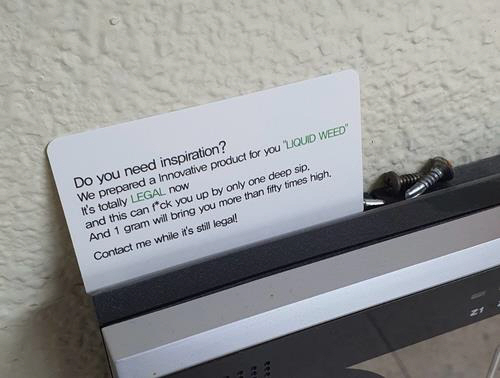 |
The suspicious business card found on the Hongik University campus in Seoul (Yonhap) |
Students at several colleges in and around Seoul found themselves embroiled in intrigue when they stumbled upon mysterious business cards scattered across campuses last week, sparking a flurry of concern across the country.
These cards, written in English and predominantly found near the schools' art departments, curiously touted "totally legal" liquid cannabis, promising "inspiration … more than fifty times high." Each card's backside featured a QR code shaped like a marijuana leaf that linked to a Telegram chatroom with the purported seller.
Contrary to the seller's claim, recreational marijuana use remains strictly prohibited in South Korea. Korean nationals can face criminal punishment even for use in countries where it is legal.
Responding to the discovery, colleges alerted police and warned students against scanning the QR code. Police have since located over 200 such cards across three Seoul-based universities.
After reviewing security footage, Seoul Gwangjin Police arrested a man in his 40s near his Songpa-gu residence on Monday evening. A suspicious liquid, potentially the alleged liquid marijuana he attempted to sell, was found on his property and is under forensic analysis. Despite testing negative for drugs, the suspect had a 2019 conviction for dealing marijuana, according to police.
Upon questioning, the suspect claimed his intent was not to sell drugs but to scam the students, primarily targeting art students who might be seeking creative inspiration. Investigations are ongoing, but no confirmed purchases have been identified so far.
South Korea, which once boasted a "drug-free" status, has recently witnessed a spike in drug-related crimes. In the first half of 2023, 10,252 suspects were apprehended, marking a near 20 percent surge from the year before. The country is on track to surpass its 2022 record of 18,395 drug-related arrests, with the younger generation being particularly susceptible to substance abuse.







![[Today’s K-pop] Blackpink’s Jennie, Lisa invited to Coachella as solo acts](http://res.heraldm.com/phpwas/restmb_idxmake.php?idx=644&simg=/content/image/2024/11/21/20241121050099_0.jpg)